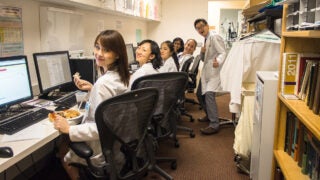The Surgeon Who United a Generation of Urology Patients
Countless men and women sent him thanks. Urologist Donald Skinner paid their generosity forward.
Patients travel to USC from around the globe to seek care for prostate, bladder and kidney cancers and other urologic problems. The university’s urology program is widely considered one of the best in the nation. But it wasn’t always this way.
What accounts for this ascent to the top?
In a word, innovation. Urologists at Keck Medicine of USC have been advancing the discipline for years. And it all started with a groundbreaking surgeon beloved by decades’ worth of patients: Donald Skinner.
Today, the gratitude of these patients has come full circle, bringing much-needed support for urology research to the university. Their generosity — gifts of a few dollars or many thousands, tucked into thank-you cards and letters — testifies to Skinner’s innovative techniques and the difference his team made in their lives.
Humble Beginnings
His USC story began nearly 40 years ago, in 1980. That’s when Skinner joined the university. The young surgeon was the only faculty member in urology, a unit that received no federal research funding.
Three decades later, when Skinner retired as department chair, Distinguished Professor and recipient of USC’s highest honor — the Presidential Medallion — the unit boasted 13 specialist physicians and seven researchers. Its surgeons performed more than 850 major operations a year and faculty members garnered millions of dollars in grants for research that advanced the field. The Catherine and Joseph Aresty Department of Urology had become a top destination for challenging cases requiring complex surgery.
“It was an amazing experience to go from scratch to build one of the great clinical urology departments supported with basic science research,” Skinner says. “We were fortunate to be in the golden era of surgery.”
Skinner specialized in major open surgery, accessing the abdominal cavity through a surgical incision. One of his groundbreaking innovations involved a procedure for bladder cancer called a radical cystectomy. In the traditional approach, surgeons removed the bladder along with nearby lymph nodes. The operation often left patients dealing with an undignified urine reservoir strapped to their side.
But Skinner had a solution. Expanding on prior work, he fashioned a new internal bladder from a section of intestine. He then developed a way to connect that new pouch to the urethra, restoring the body’s natural urinary function — along with a sense of dignity and normalcy.
“People started to come from all over the country and world because that operation was really only offered by us,” he says.
Skinner also recruited experts covering other areas of urology. He had high expectations, but his supportive and charismatic nature inspired fierce loyalty.
“He is the most ethical, thoughtful, brilliant clinician I’ve ever known,” says Eila Skinner, who isn’t related to Donald Skinner, but trained and worked under him for nearly two decades at USC. She now heads Stanford University’s urology department. “He’s also probably the best open surgeon I’ve ever seen,” she says. “He was technically adept, able to get out of any problem, very efficient — just magical.”
Urology Beyond Surgery
But for all the success of the clinical practice, Donald Skinner wanted to build something bigger. He shifted his attention to developing a strong research program, and he needed funding.
Support came from an unexpected source — tennis pro Butch Walts. With Skinner’s help, the star athlete had beaten testicular cancer and he wanted to show his appreciation with a donation. Walts proposed creating a nonprofit foundation. He held tennis exhibitions with stars like Björn Borg, John McEnroe and Martina Navratilova, raising about $400,000.
Skinner also began sending out personal letters describing his vision for the program, and his grateful patients responded. Many pitched in $10 or $20. Some gave more than $25,000. Together, they contributed millions. This proved essential to the department’s growth, helping Skinner recruit researchers and bring in big grants.
In 2017, nearly 10 years after his retirement, Skinner donated the $11 million that remained in the foundation to USC to establish the Shirley and Donald G. Skinner Endowed Chair of Urologic Cancer Surgery. The gift also created a cancer research endowment and a fellowship in urologic oncology named after longtime colleague Gary Lieskovsky.
“Rarely do you have the opportunity to go to a major university and build a department from scratch,” he says. “I was fortunate to build a great foundation that would be able to support the future skyscraper that the department has become today.”



